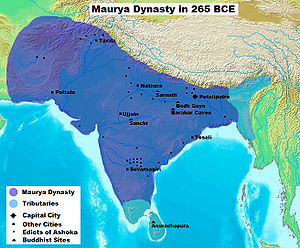Collectivistic cultures generally include social responsibilities in their activities, strongly influenced by religious and cultural values handed down generation to generation through community interactions. In the India of early history, social responsibility marked social behaviour. Ethics in politics and business were also based on these values. However, centuries of later colonizations, wrought dilutions in these traditions as Western practices took root.
The values-based social context dates back at least three millennia to the Indus Valley Civilization. Traditions originating then regulated community living and trade practices in those times, and beyond. In terms of economic power, during the reign of the Maurya dynasty, India’s influence extended through the Middle East even to Europe. She has been a formidable presence in Asia through much of the ancient and mediaeval ages, rivaled at times only by China.

Eighteenth century onwards, however, there was a steep and rapid downfall both in nationhood and economics. European adventurers - Dutch, Portuguese, French and especially the English, arrived in the region as traders, and went on to become rulers. Following the Western economic concept of self-interest, the East India Company resorted to guile and deception to appropriate power over people and resources. Eventually, the entire Indian subcontinent was subject to the Crown, ensuring that the sun never set on the British Empire.
The autocratic colonial practices also gave birth to the Independence Movement in India. Mahatma Gandhi, the architect of the non-violent struggle, organized the Salt March at Dandi, against the imposition of new taxes on salt. This symbolic confrontation of foreign occupation with only 78 followers inspired aspirations of freedom amongst the masses. Tom Weber writes:
The Salt March is about a battle by an astute political campaigner to free his country from the yoke of British colonialism. Here we have the skinny, scantily dressed 61- year-old Mahatma armed with nothing but a bamboo staff marching to the sea with a handful of followers, mostly young, in an attempt to liberate India.
Gandhi was not an economist, but a transformational leader who advocated nationalism (swadeshi) socially and self-rule (swaraj) politically and economically. He believed that the exercise of ownership was a selfish and dysfunctional pathway that bred inequalities and conflict amongst people. He wrote in the “Harijan” (the word coined to uplift ‘untouchable’ castes) in 1937:
True economics stands for social justice; it promotes the good of all equally, including the weakest, and is indispensable for decent life…
The accumulation of wealth by the privileged few signifies a disregard for society. Gandhi’s concept of trusteeship, in which dignity is integral, is based on traditional moral and spiritual values. Kumar explains the socialistic overtones of the concept:
Trusteeship provides a means of transforming the present capitalist order into an egalitarian one... Under such an economic order, the character of production will be determined by social necessity and not by personal greed.

Trusteeship departs significantly from other prominent socialist philosophy. It may be said to call for evolution of the mind, in place of a bloody revolution. Kumar says further:
Marxian socialism aims at the destruction of the class called capitalists, whereas the Gandhian approach is not to destroy the institution, but to reform it… Gandhian socialism aims at a change of heart on the part of the rich. There is no place for violence, but only trust. The common man trusts his trustee and the latter plays the role of a custodian.
The leadership in any sphere merely fulfils the role of a custodian of the systemic values, aspirations, resources and so on. The trustee or steward is entrusted to charter the right course for the collective. In an egalitarian society, they are the best people for the job, rewarded by the system according to their needs (not wants).
Colonial rule depleted India’s national coffers. As a nascent independent country post-British rule, she faced economic penury. Despite becoming a democracy, for at least three decades post-independence, the central political leadership determined the course of all development in the country. Some loosening of this government control also over business occurred in the late `70s and early `80s.
Colonial rule depleted India’s national coffers. As a nascent independent country post-British rule, she faced economic penury. Despite becoming a democracy, for at least three decades post-independence, the central political leadership determined the course of all development in the country. Some loosening of this government control also over business occurred in the late `70s and early `80s.
The economic reforms and liberalizations conducive to global entrepreneurship took shape only from 1991. The philosophy has undergone considerable change from the Gandhian concept of trusteeship. Nevertheless, India’s relative escape from the global impact of recession has been attributed to the restrictive measures that still remain.
Next…domination

No comments:
Post a Comment